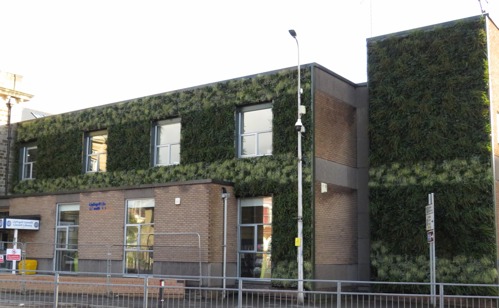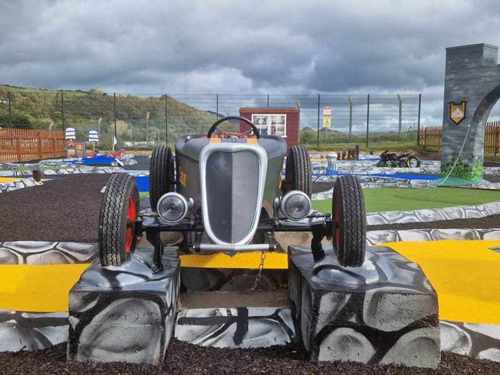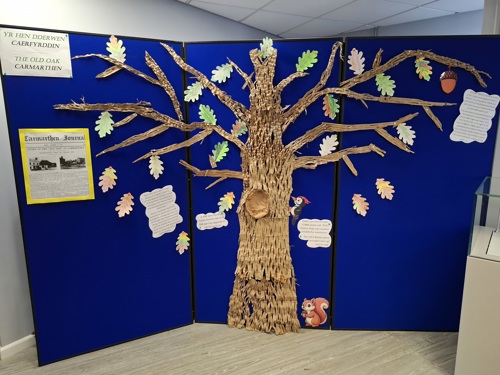Case Studies and Success stories
Page updated: 08/05/2025
Carmarthenshire County Council has delivered and continues to deliver a vast variety of projects that help mitigate and adapt to climate change. Here are just a handful of projects that have recently been completed.
Work has recently been completed at Carmarthen Learning Centre to make it more energy efficient and reduce its carbon emissions by 76%. Retrofit measures that include cavity wall insulation, double glazing, and roof improvements have been implemented to improve the heat retention of the building. The Learning Centre is no longer reliant on a gas supply as Solar Panels an Air Source Heat Pump provide energy and heat to the building. Energy efficient LED lighting have also been installed.
Not only has the upgrade works reduced the building's environment impact, it has also improved the comfort and experience for those who work and learn in the building.
To help improve Carmarthenshire’s Authority’s environment and increase biodiversity, the Council’s Rural Conservation Team and Property Department arranged the planting of over 8,000 native broadleaved trees to create 4.5 hectares of new woodland on Council owned land at Tregib (Llandeilo), Pendre (Kidwelly) and Maesdewi (Llandybie). Community planting days, including a day for pupils from Llandybie Primary School, were held at two of the locations.
As trees grow and photosynthesise, they will extract carbon emissions from the atmosphere. These new woodlands will provide new habitats for wildlife and thus contribute to addressing the nature emergency and become places where people can enjoy nature.
Plans have been put together by the Council’s Conservation team, with the help of the Botanic Gardens, for a Tree Nursery and wildlife friendly grounds to be developed in Johnstown Day Centre. With financial support from ‘Places for Nature’ funding scheme, the garden will include an accessible outdoor growing area and sensory garden, a woodland garden, a bog garden, meadow areas and an orchard. Although the project is taking place at the Johnstown centre, it will involve all day services through the collecting and planting of native seeds. There are also plans for a similar project to take place at Manor Road Day Centre. Not only will the garden improve the biodiversity of the area, but it will also provide a safe and accessible space for all to enjoy.
Over many years, across Britain, there has been a huge decline in insects which pollinate our wildflowers, and our crops, also known as pollinators. Carmarthenshire County Council currently is looking at ways of managing grassland that will make it both richer in wildflowers and more attractive to pollinators. Simply by cutting less frequently, flowers that are already growing in the grass can flower and also support insects. There is no need to sow wildflower seed. Last summer the Council experimented with this new approach and it was well received by residents who enjoyed seeing the flower rich grasslands that appeared.
The decarbonisation of heat is the biggest challenge we currently face as the production of heat requires huge amounts of energy. We are extremely fortunate to have been successful in receiving the Low Carbon Heat Grant from the Welsh Government, which saw the installation of air source heat pumps at 6 primary schools across the county. Their fossil fuelled heating systems have been removed, saving 161tCO₂e annually from being emitted into the atmosphere. Roof mounted solar PV was also installed at all the schools to help mitigate the electricity required to run the heat pumps, making the systems even more sustainable.
A Living Wall has recently been installed on Llanelli Library’s façade which has numerous benefits. It has increased local biodiversity and improved the air quality of the town. It also sequesters 23.56kg of carbon annually, which is the equivalent to 6 medium sized trees, whilst also boosting people’s well-being.

Carmarthenshire County Council has partnered with Nappicycle to deliver an innovative project that tackles two major challenges- diverting waste from landfill and sustainable road maintenance. The pilot project on the B4336 at Pontweli saw approximately 80,000 nappies, which were collected by the Council, recycled into fibrous pellets at Nappicycle’s facility in Capel Hendre. These pellets were then incorporated into the Stone Mastic Asphalt (SMA) surfacing material at the GH Harries plant in Ludchurch, Pembrokeshire. This SMA was then used for road surface improvements. This project is a perfect exemplar of a local circular economy in action as well as more sustainable waste and highway management. Using local contractors has also had a greater impact on reducing our carbon footprint by reducing miles travelled, whilst simultaneously having other benefits like boosting the local economy.

Our Leisure department is promoting sustainable development through their Green Champions.
The Champions are volunteers from different leisure teams and meet monthly to discuss projects and share good practice. Their aim is to encourage all staff to work and think sustainably so it becomes second nature. They have also written the Sustainability Plan for Leisure Services (July 2024) which sets out how the Leisure service is going to mitigate climate change and increase biodiversity. They regularly circulate feedback forms to staff to encourage them to make a green pledge and to submit their ideas on how to save energy and reduce carbon emissions. Furthermore, they have encouraged carbon reduction and circular economy principles to be included within procurement evaluation criteria’s, which have recently been used in the procurement exercises for vending machines within leisure facilities and the new crazy golf facility at Y Caban in Pendine. They included specifications, such as, local suppliers, the use of recycled materials, the reduction of single-use plastic and equipment that can be recycled.
To find out more or how you can get involved please contact Richard Stradling – Rstradling@carmarthenshire.gov.uk.

Carmarthen Leisure Centre has recently been commended for their efforts on introducing segregated recycling to the site, with WRAP Cymru using them as an exemplar on their website. The site has successfully increased their recycling rate to 70% of all waste. To find out more about how Carmarthen Leisure Centre has introduced the new workplace recycling law please visit Workplace Recycling -Webinars

Carmarthen Library created a tree out of recycled packaging, showcasing how waste can become art. Local school children from Richmond Park School decorated the tree with leaves. On the leaves they wrote ideas on how they can be more environmentally friendly. The tree stands proud in the library to encourage others to also think about how they can make a difference.

More from Climate Action Carmarthenshire
